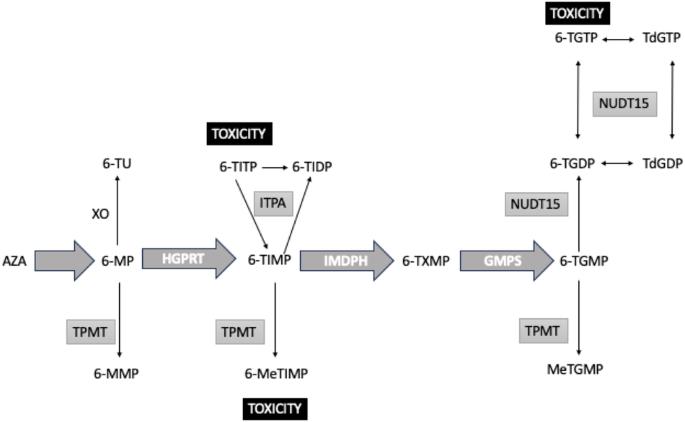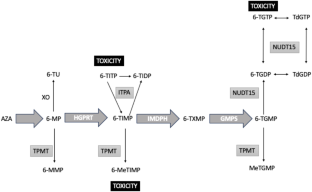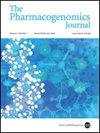Predictive role of ITPA genetic variants in thiopurine-related myelotoxicity in Crohn’s disease patients
IF 2.9
3区 医学
Q2 GENETICS & HEREDITY
引用次数: 0
Abstract
Thiopurines, an effective therapy for Crohn’s disease (CD), often lead to adverse events (AEs). Gene polymorphisms affecting thiopurine metabolism may predict AEs. This retrospective study in CD patients (n = 114) with TPMT activity > 5 Units/Red Blood Cells analyzed TPMT (c.238 G > C, c.460 G > A, c.719 A > G), ITPA (c.94 C > A, IVS2 + 21 A > C), and NUDT15 (c.415 C > T) polymorphisms. All patients received azathioprine (median dose 2.2 mg/kg) with 41.2% experiencing AEs, mainly myelotoxicity (28.1%). No NUDT15 polymorphisms were found, 7% had TPMT, and 31.6% had ITPA polymorphisms. AEs led to therapy modifications in 41.2% of patients. Multivariate analysis identified advanced age (OR 1.046, p = 0.007) and ITPA IVS2 + 21 A > C (OR 3.622, p = 0.015) as independent predictors of AEs. IVS2 + 21 A > C was also associated with myelotoxicity (OR 2.863, p = 0.021). These findings suggest that ITPA IVS2 + 21 A > C polymorphism and advanced age predict AEs during thiopurine therapy for CD with intermediate-normal TPMT activity.


ITPA 基因变异在克罗恩病患者硫嘌呤相关骨髓毒性中的预测作用。
硫嘌呤类药物是治疗克罗恩病(CD)的一种有效疗法,但经常会导致不良反应(AEs)。影响硫嘌呤代谢的基因多态性可预测不良反应。这项回顾性研究分析了 TPMT(c.238 G > C、c.460 G > A、c.719 A > G)、ITPA(c.94 C > A、IVS2 + 21 A > C)和 NUDT15(c.415 C > T)多态性。所有患者都接受了硫唑嘌呤治疗(中位剂量为 2.2 毫克/千克),其中 41.2% 的患者出现了 AEs,主要是骨髓毒性(28.1%)。未发现 NUDT15 多态性,7% 的患者存在 TPMT 多态性,31.6% 的患者存在 ITPA 多态性。41.2%的患者因AE导致治疗调整。多变量分析发现,高龄(OR 1.046,p = 0.007)和 ITPA IVS2 + 21 A > C(OR 3.622,p = 0.015)是 AEs 的独立预测因素。IVS2 + 21 A > C 还与骨髓毒性相关(OR 2.863,p = 0.021)。这些研究结果表明,ITPA IVS2 + 21 A > C多态性和高龄可预测TPMT活性中等正常的CD患者在接受硫嘌呤治疗期间出现的AEs。
本文章由计算机程序翻译,如有差异,请以英文原文为准。
求助全文
约1分钟内获得全文
求助全文
来源期刊

Pharmacogenomics Journal
医学-药学
CiteScore
7.20
自引率
0.00%
发文量
35
审稿时长
6-12 weeks
期刊介绍:
The Pharmacogenomics Journal is a print and electronic journal, which is dedicated to the rapid publication of original research on pharmacogenomics and its clinical applications.
Key areas of coverage include:
Personalized medicine
Effects of genetic variability on drug toxicity and efficacy
Identification and functional characterization of polymorphisms relevant to drug action
Pharmacodynamic and pharmacokinetic variations and drug efficacy
Integration of new developments in the genome project and proteomics into clinical medicine, pharmacology, and therapeutics
Clinical applications of genomic science
Identification of novel genomic targets for drug development
Potential benefits of pharmacogenomics.
 求助内容:
求助内容: 应助结果提醒方式:
应助结果提醒方式:


